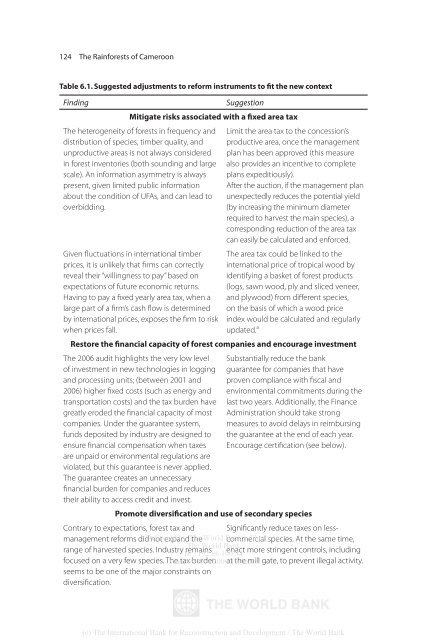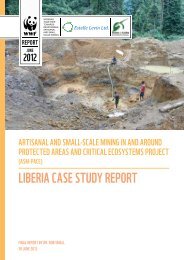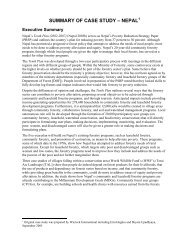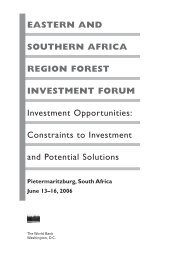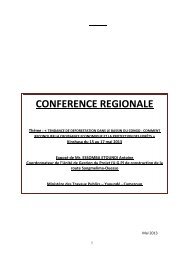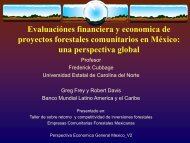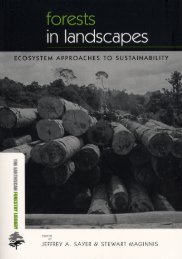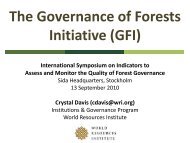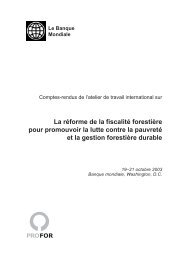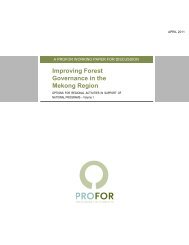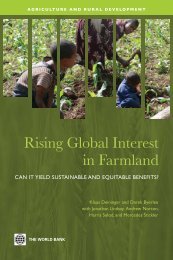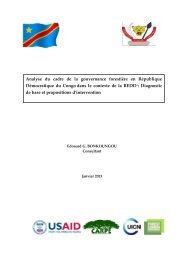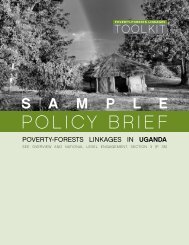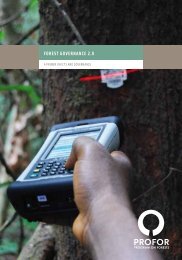The Rainforests of Cameroon - PROFOR
The Rainforests of Cameroon - PROFOR
The Rainforests of Cameroon - PROFOR
- No tags were found...
Create successful ePaper yourself
Turn your PDF publications into a flip-book with our unique Google optimized e-Paper software.
124 <strong>The</strong> <strong>Rainforests</strong> <strong>of</strong> <strong>Cameroon</strong>Table 6.1. Suggested adjustments to reform instruments to fit the new contextFindingSuggestionMitigate risks associated with a fixed area tax<strong>The</strong> heterogeneity <strong>of</strong> forests in frequency anddistribution <strong>of</strong> species, timber quality, andunproductive areas is not always consideredin forest inventories (both sounding and largescale). An information asymmetry is alwayspresent, given limited public informationabout the condition <strong>of</strong> UFAs, and can lead tooverbidding.Given fluctuations in international timberprices, it is unlikely that firms can correctlyreveal their “willingness to pay” based onexpectations <strong>of</strong> future economic returns.Having to pay a fixed yearly area tax, when alarge part <strong>of</strong> a firm’s cash flow is determinedby international prices, exposes the firm to riskwhen prices fall.Limit the area tax to the concession’sproductive area, once the managementplan has been approved (this measurealso provides an incentive to completeplans expeditiously).After the auction, if the management planunexpectedly reduces the potential yield(by increasing the minimum diameterrequired to harvest the main species), acorresponding reduction <strong>of</strong> the area taxcan easily be calculated and enforced.<strong>The</strong> area tax could be linked to theinternational price <strong>of</strong> tropical wood byidentifying a basket <strong>of</strong> forest products(logs, sawn wood, ply and sliced veneer,and plywood) from different species,on the basis <strong>of</strong> which a wood priceindex would be calculated and regularlyupdated. aRestore the financial capacity <strong>of</strong> forest companies and encourage investment<strong>The</strong> 2006 audit highlights the very low level<strong>of</strong> investment in new technologies in loggingand processing units; (between 2001 and2006) higher fixed costs (such as energy andtransportation costs) and the tax burden havegreatly eroded the financial capacity <strong>of</strong> mostcompanies. Under the guarantee system,funds deposited by industry are designed toensure financial compensation when taxesare unpaid or environmental regulations areviolated, but this guarantee is never applied.<strong>The</strong> guarantee creates an unnecessaryfinancial burden for companies and reducestheir ability to access credit and invest.Substantially reduce the bankguarantee for companies that haveproven compliance with fiscal andenvironmental commitments during thelast two years. Additionally, the FinanceAdministration should take strongmeasures to avoid delays in reimbursingthe guarantee at the end <strong>of</strong> each year.Encourage certification (see below).Promote diversification and use <strong>of</strong> secondary speciesContrary to expectations, forest tax and Significantly reduce taxes on lesscommerciale-library species. to: At the same time,management reforms did Delivered not expand by <strong>The</strong> the World Bank<strong>The</strong> World Bankrange <strong>of</strong> harvested species. IndustryIPremains: 192.86.100.34enact more stringent controls, includingfocused on a very few species. <strong>The</strong> Mon, tax 09 burden Nov 2009 at 17:06:18 the mill gate, to prevent illegal activity.seems to be one <strong>of</strong> the major constraints ondiversification.(c) <strong>The</strong> International Bank for Reconstruction and Development / <strong>The</strong> World Bank


